What Makes a TV Pilot Great?
We go over the elements that make a story pop off the page.
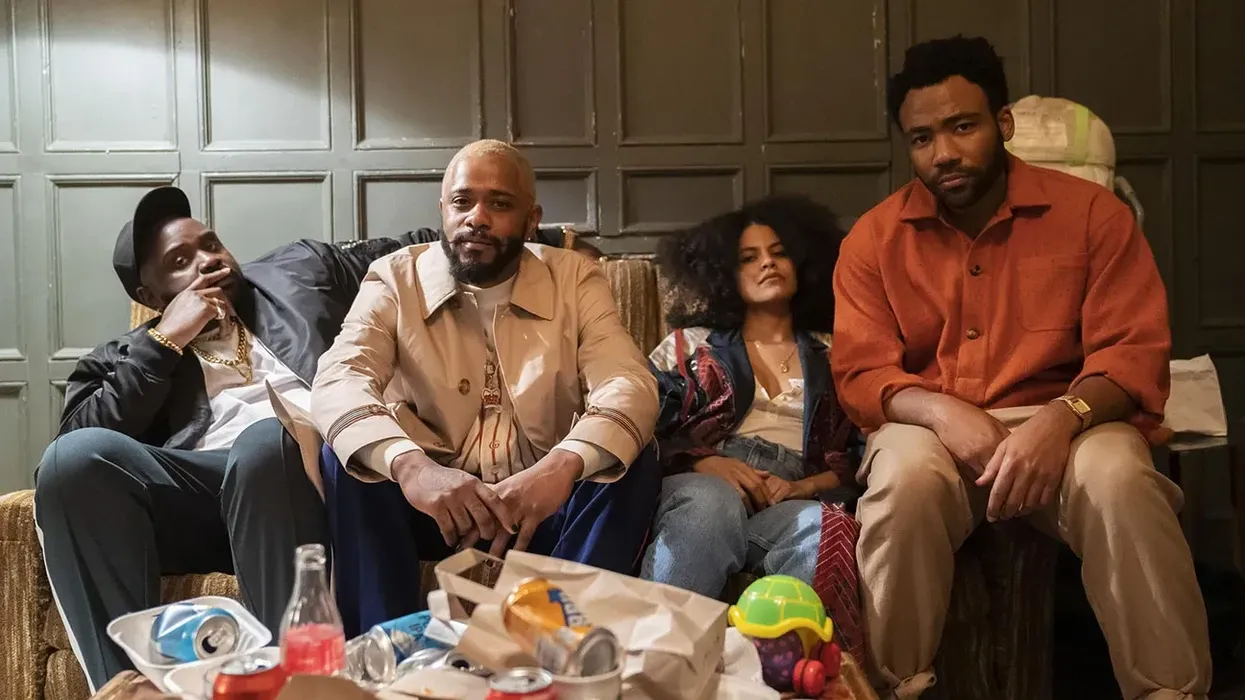
Atlanta
As we enter the top of a new year, I'm on a mission to renew my pilot samples. And since procrastination is part of my process, this also becomes the time when I watch the most TV and read the most screenplays. But all this is done with a purpose.
I want to figure out what makes a TV pilot great.
The reason I do all this digging is that I want to emulate those elements as I prepare my TV pilots.
Today, we're going to answer that question. We'll look at a few examples and dig into the world of TV writing in general.
Let's dive in.
How Can You Tell If A TV Pilot is Great?
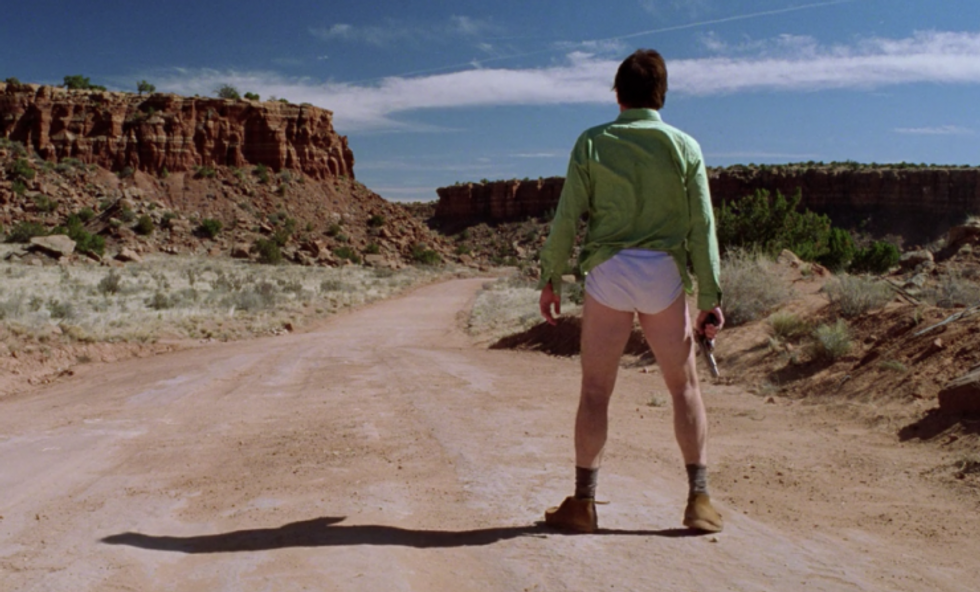
Breaking Bad
AMC
The easy answer here is the writing. There's something that just pops of the page when you read great writing. It's an ease with which you absorb that story.
The same goes when you watch it. Maybe the visuals pull you in or the pace of the editing.
But at the end of the day, it's the writing that makes everything click. While comedy and drama differ in tone, some key ingredients contribute to exceptional writing in both:
- Compelling Characters: We need to care about the people on screen. Pilots introduce central characters with clear goals, desires, and flaws. These characters should grapple with interesting challenges that make us root for them.
- Intriguing Premise: What's the core conflict or situation driving the show? A pilot should establish a strong central premise that sparks curiosity and sets the stage for future storylines.
- Compelling World: Whether it's a heightened fantasy realm or a relatable small town, the pilot should introduce the show's world in a way that feels fresh and invites exploration.
- Emotional Connection: Great pilots don't just entertain; they make us feel. They can make us laugh until our sides hurt, scare us silly, or leave us pondering life's big questions.
- Strong Voice and Tone: A pilot should establish the show's unique voice and tone. Is it a quirky dramedy, a heart-wrenching tearjerker, or a laugh-out-loud sitcom?
What Are The Core Elements of a Great Comedy TV Pilot
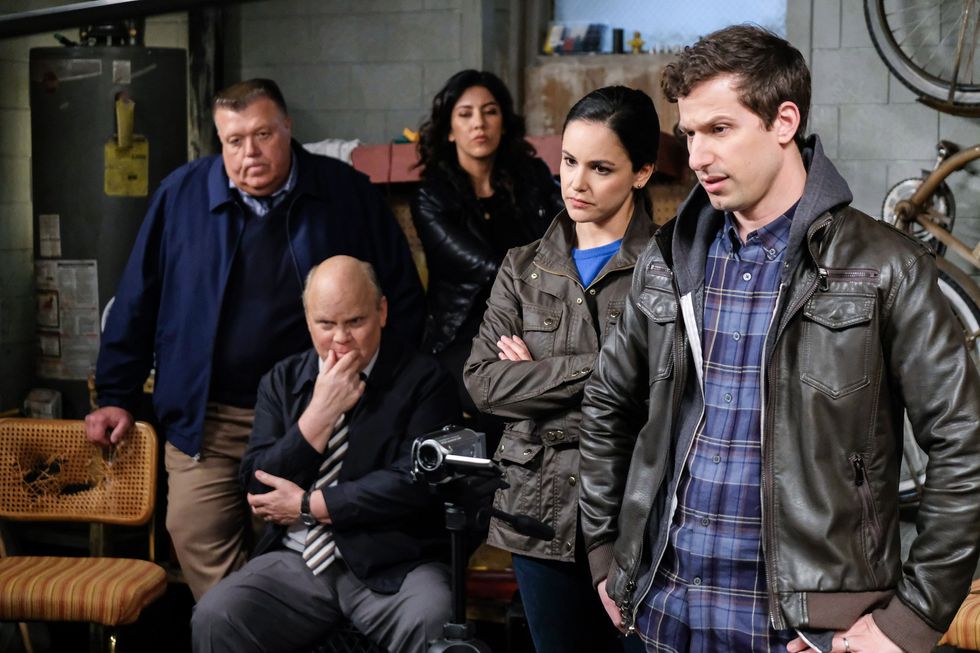
Brooklyn Nine-Nine
FOX
When I think about my favorite TV comedy pilots, I think about how hard they made me laugh first. That seems simple, but if you pitch a comedy, it better come out funny.
A great comedy pilot needs to do more than just make us laugh, you need the story to back it up too. And it has to give us a taste of the unique voice of the show.
Some specific techniques often used in effective comedy pilots include:
A Great Premise
- Situational Comedy: The very situation the characters find themselves in generates humor. Shows like Seinfeld, with its focus on the absurdity of everyday life, or The Office, with its cringeworthy workplace environment, are prime examples.
- Absurd or Heightened Reality: The world of the show itself operates on its own unique logic, exaggerating reality to great comedic effect. Arrested Development or Community are great examples of this style.
- Fish Out of Water: A character is placed in a setting or situation wildly unfamiliar to them. Think Ted Lasso with its American football coach navigating the world of English soccer, or Schitt's Creek with its wealthy family losing everything and moving to a small town.
Memorable Dialogue
- Snappy One-liners: Think Chandler Bing's sarcasm in Friends or Eleanor's retorts in The Good Place. Memorable zingers become a key part of the show's personality.
- Banter and Chemistry: The back and forth between characters should be playful, sharp, and reveal their unique personalities. The dynamic between characters like Jake and Amy in Brooklyn Nine-Nine is a great example.
- Timing and Delivery: Even the funniest lines can fall flat with the wrong delivery. Great comedy pilots showcase actors who understand comedic timing and can sell a joke.
Characters with Exaggerated Flaws
- Loveable Losers: Michael Scott and Leslie Knope are flawed characters, but their heart and dedication make them endearing and root-worthy.
- Unfiltered and Outrageous: Characters who are unafraid to say the wrong thing or act without common sense can be hilarious. Look to Abed from Community and Gob from Arrested Development.
- Embracing the Cringe: Audiences often get the best laughs by watching characters in socially awkward situations, fumbling interactions with hilarious results.
Setting the Tone
- Lighthearted vs. Edgy Humor: Does the comedy lean towards absurd silliness or sharper, satirical humor? The pilot should clearly establish which direction the show plans to take.
- Format Matters: Sitcoms, mockumentaries, and single-camera comedies all have different rhythms and comedic possibilities. The pilot should effectively use its format to its advantage.
What Are The Core Elements of a Great Drama TV Pilot
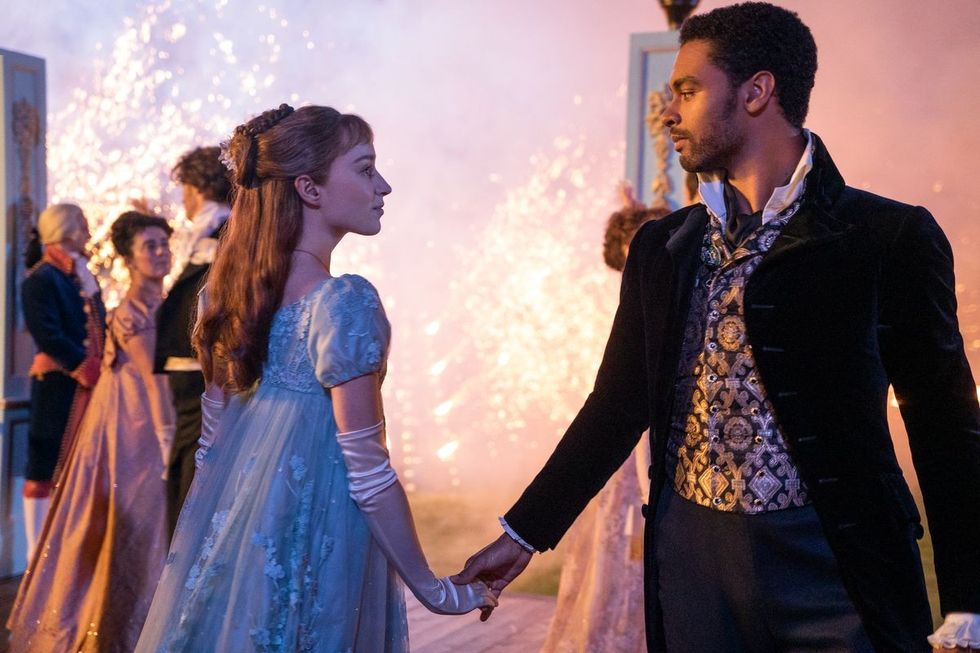
Bridgerton
Netflix
Drama pilots are usually an hour long, so they have a lot more story and characters to introduce. They also have to set the tone for the show and define the kind of drama they're delivering.
There's a big difference between Gilmore Girls and Game of Thrones.
They also have to leave an audience begging to know what happens next. That can come in the form of a cliffhanger or just questions about how relationships move forward.
Drama pilots focus on building suspense and emotional engagement. Here are some techniques that can make a dramatic pilot stand out:
A High-Stakes Conflict
- The Inciting Incident: A significant event disrupts the status quo, forcing the characters to confront a major challenge or conflict. This could be a murder, a life-altering diagnosis, a betrayal, or a societal upheaval. Like Laura Palmer's death in Twin Peaks.
- Moral Dilemmas: The best drama pilots pose questions that force characters to grapple with complex choices and the lesser of two evils. There should be no easy answers, leaving the audience mulling over the implications. Even if that's spending time with your parents to send your kid to a private school, like in Gilmore Girls.
- Clear Stakes: The conflict should have significant consequences for the characters and their world. Viewers need to feel the weight of potential loss, failure, or drastic change.
Complex, Flawed Characters
- Internal Struggles: Great characters in dramas aren't solely defined by external events. They wrestle with inner demons, past traumas, or conflicting desires that influence their choices in the face of the central conflict.
- Growth Potential: While starting with flawed characters is important, a strong pilot signals that there's room for change, redemption, or further descent as the show develops. Like Tony Soprano going to therapy.
- Relatability: Even in extraordinary situations, the best dramatic characters have something relatable at their core – desires, fears, strengths – that enable the audience to connect with them. We understand the want for safety and security in Game of Thrones.
Intriguing Worldbuilding
- Unique Setting: Whether it's a specific historical period, a dystopian future, or a grounded but hyper-specific community, a great pilot establishes a world with its own rules, power dynamics, and potential for further exploration. Like the people disappearing in The Leftovers.
- Atmosphere: Drama pilots excel at creating a sense of mood through visuals, sound design, and the tone of the dialogue. Think of the stark tension in Breaking Bad or the rich historical detail in Mad Men.
- Unanswered Questions: A strong pilot establishes a sense of mystery or hints at a larger, interconnected story to keep the audience hungry for more answers.
Emotional Pull
- Hooking the Viewer: The pilot should have an opening act that immediately grabs the viewer's attention and makes them invested in the characters and their plight. Nothing grabs you more than the plane wreck on Lost.
- Evocative Moments: Drama pilots can generate powerful emotions: shock, suspense, sadness, empathy. Key moments in the pilot should linger with the audience long after they finish watching.
- Building Tension: The conflict should escalate throughout the pilot, with setbacks and complications that raise the stakes and keep the audience on the edge of their seats. We aren't sure where things go in Stranger Things once a kid disappears.
What Are Some Great TV Pilot Examples?
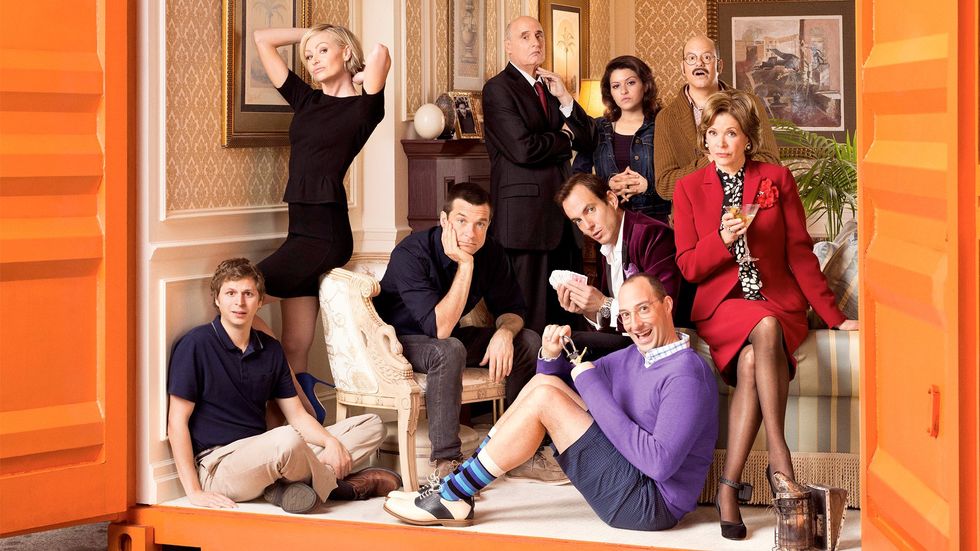
Arrested Development
Netflix
Look, if you're like me, you want to see what some of the best pilots of all time look like on the page. So, I wanted to add a bunch of hyperlinks here to the PDFs of each pilot.
But instead of reading blind, I made a list of the stuff you should look out for that each pilot does extremely well.
Comedy
- 30 Rock - "Pilot" (2006)
- A chaotic and hilarious glimpse into the world of a live sketch comedy show.
- Tina Fey's Liz Lemon is a relatable and flawed protagonist trying to juggle absurd demands.
- The fast-paced jokes, meta-humor, and eccentric supporting cast immediately establish the show's unique comedic voice.
- Parks and Recreation - "Pilot" (2009)
- Introduces the relentlessly optimistic Leslie Knope and the quirky cast of Pawnee's Parks Department.
- While a bit shaky in this first episode, it succeeds in establishing a world of well-meaning but endearingly incompetent bureaucrats.
- The show's heartwarming and hilarious tone shines through, promising potential for future comedic storylines.
- Brooklyn Nine-Nine - "Pilot" (2013)
- A hilarious mix of workplace comedy and police procedural, with a focus on a talented but immature detective.
- The cast bounces off each other to create fantastic chemistry, promising great ensemble comedy in future episodes.
- Balances goofy physical humor with surprisingly sharp writing.
- The Office (US) - "Pilot" (2005)
- Masterclass in cringe humor, fueled by Michael Scott's inappropriate behavior and utter lack of self-awareness.
- Introduces a strong ensemble cast with hints at the hilarious dynamics to come.
- Mockumentary format enhances the humor, allowing for hilarious direct-to-camera asides.
- Arrested Development - "Pilot" (2003)
- Plunges viewers into the absurdly dysfunctional Bluth family with a breakneck pace and hilarious narration.
- Quirky characters with exaggerated flaws immediately hook viewers.
- Sets up an ongoing mystery surrounding the family business, keeping audiences engaged.
- Atlanta - "The Big Bang" (2016)
- Grounded and relatable, following Earn's attempts to manage his rapper cousin's rising career.
- Blends humor with social commentary and poignant observations about race and ambition.
- Unique tonal shifts keep the audience surprised and engaged.
Drama
- Breaking Bad - "Pilot" (2008)
- Shocking opening act thrusts unassuming Walter White into a high-stakes criminal world after his cancer diagnosis.
- Introduces complex themes of morality, family, and desperation with an instantly compelling hook.
- Walter's descent is both captivating and unsettling, setting the stage for a morally complex character study.
- The Wire - "The Target" (2002)
- Dives into the complex world of Baltimore's drug trade with a layered, methodical approach.
- Focus on multiple perspectives (cops, criminals, politicians) gives a nuanced view of systemic problems.
- Establishes the show's gritty realism and its focus on flawed, multifaceted characters.
- Mad Men - "Smoke Gets in Your Eyes" (2007)
- Evokes the 1960s advertising world with style and atmosphere, drawing viewers into a time of social upheaval.
- Don Draper is a deeply flawed, enigmatic protagonist, hinting at secrets and inner turmoil.
- Raises questions about identity, ambition, and the lies we tell ourselves and others.
- Lost - "Pilot (Parts 1 & 2)" (2004)
- A powerful two-part pilot opens with a gripping plane crash on a mysterious island.
- Large ensemble cast creates opportunities for exploring various character backstories and interpersonal conflicts.
- Masterfully weaves elements of suspense, mystery, and hint at supernatural elements.
- The Handmaid's Tale - "Offred" (2017)
- Haunting and visceral, this pilot plunges us into the dystopian world of Gilead through the eyes of Offred, a woman forced to be a childbearing servant.
- Stunning visuals and Elisabeth Moss's powerful performance establish a chilling atmosphere of oppression and resilience.
- Uncomfortable but compelling, raising questions about power, control, and resistance.
- Friday Night Lights - "Pilot" (2006)
- A grounded and heartwarming portrayal of small-town Texas with football as its beating heart.
- Focuses on complex characters, like Coach Taylor and his troubled star player, facing both personal and team-related conflicts.
- Evocative cinematography and heartfelt performances create a relatable and moving portrayal of community and sportsmanship.
Hopefully, this opened your eyes to some great pilots, and you're well on your way to writing some of your own. If you want help writing a TV pilot, we have you covered there too.
Let me know what you think in the comments.
- How to Write a TV Show Pilot (Drama or Sitcom) ›
- Did 'Cheers' Have the Best Sitcom Pilot of All Time? ›
- How To Break Your TV Pilot ›











